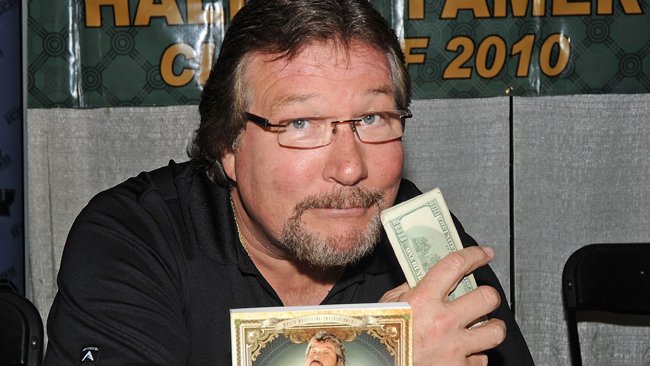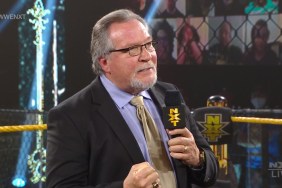The “Million Dollar Man” Ted DiBiase recently spoke with Ring Rust Radio while promoting his upcoming documentary “The Price Of Fame”; you can read a few highlights below:
Ted DiBiase on what he hopes to accomplish with his documentary:
Basically, when people walk away from this, I’m hoping number one, that they will realize there’s hope. The shared struggle of my own in the Price of Fame, I don’t want it to be misinterpreted as oh my gosh, fame and all these things can happen. But it’s what you do with it, its individual decision. Fame is not what everybody thinks it is. For example, people would say oh my gosh it must be a thrill to be in an arena full of people 40,000, 50,000 or 80,000 people, the largest crowd I’ve ever been in front of and they are screaming your name and know who you are. Okay that’s great, but once that shows over, you go back to your hotel room, you look at four walls and the TV and your wife and family are two to 20,000 miles away and they aren’t there with you. That’s when a lot of the stuff starts. It’s about accountability. What I really want people to really realize walking away from this is that what everybody seems to think in the world if I have this great job and I make a lot of money and a nice house and a big car and all the stuff that it’ll make you happy. Guys, I had that and not only did I have it, but Vince McMahon was promoting me. He was sending me everywhere first class, Learjets, limousine, the whole star treatment and I came to a place and realized that with all of that, if I didn’t have the love and respect of my wife and my children, I didn’t have anything. I didn’t have anything that mattered. That’s odd for the guy that played the Million Dollar Man who said money is everything, but it’s not. It’s so superficial you can’t believe it because I came from that place. That’s what this story is about so I hope people come away with it realizing that happiness is not about money and being cool. It’s about character and integrity. It’s not about what you get as how much you give and that’s what I am trying to do with my life now.
Ted DiBiase on working with his son Ted DiBiase Jr on the project:
Well, it was all part of the process. Again, the things I value the most are my family, my wife and my sons. When this all broke down with my wife way back when it first came out, one of the things that she said to me was, “Despite what you’ve done to me, you’re a great dad. I don’t want to destroy that so until these boys are old enough to understand this, they don’t need to know about it.” So, it was never spoken about, but at the same time, I started going to churches and telling the story, so my boys had sat in church and they had heard me tell the story very candidly, honestly. And forthrightly. I waited for them to come to me with questions. So, when this project came up, my son said how about we put a twist on the story and tell the story maybe through our eyes? I said that’s good because this is not just going to reach struggling married couples. This is about a father and son relationship as well and I speak about father and son relationships and how important it is. We have 30 percent of the children in the United States being raised without dads. The breakdown of the families is the breakdown of our society as far as I’m concerned and it starts with the dad. So that’s the other big part of this that I see and that I hope people come away from the film understanding.
Ted DiBiase comments on playing the Million Dollar Man and his favorite memories in the role:
The Million Dollar Man the character is actually a Vince McMahon original. It was presented to me and Vince kind of started laying it out. but in a moment when he was called away and I was just sitting there with Pat Patterson who at the time was his right-hand man, Pat looked at me and said, “Ted, if Vince can be a character in his own show, this is it, this is who he would be.” It had never been done before. Vince said, “I chose you because you’re articulate, you carry yourself well, you interview very well, you are a great wrestler, you’re perfect for this.” That’s how it came to fruition. Reality is when I left, if you watched Vince, for the longest time everybody thought Vince McMahon was just the announcer. They didn’t know he owned the company. As Vince injected himself more and more into his own program, he actually kind of became the character. In all of the things I’ve done, every time I do an interview, I get asked the same question. Matter of fact, I think the WWE, I’m 63 years old and I have new action figures coming out still. The WWE put out an action figure of me and in the box with the figure, looks like it had a gold briefcase and it had a basketball. I can’t believe there’s a basketball in there! The truth is all the things we did on television they were staged. There set up and all the people got the money and at live events I would do things, there were just off-the-cuff but they were prearranged. Managers have kids picked out of the crowd and come in the ring to do something stupid and give them 300 bucks. The thing with this little boy, we rehearsed it, they knew, they got the money, but when we did it live I had to be the Million Dollar Man. I had to be hardcore. My voice is deep and it carries and when I said, “If you don’t get the job done, you don’t get the money,” it scared him. He got crocodile tears and ran to his mother; he couldn’t have done it any better. Of course, when I got to the back everybody’s high fiving and going yes, yes that was great! I said I’m glad you’re all happy, now can someone please find an armored vehicle to get me out of this building? People were just like oh my gosh and I’ve heard it for 20 years.
Ted DiBiase shares his memories of Bobby Heenan:
Bobby Heenan to me, he was the best. Of all the guys that have been managers that can pick up a microphone and talk, he was a natural and so good. His character like mine was so hated, it was like a little weasel. Everybody wanted to kill him and that was the whole point. Bobby Heenan was as quick-witted off the cameras as he was on the camera and just as funny. A great guy and I just thought the world of him as a person. Married for a long, long time and I can’t remember how long he was married to his wife, but of course in a business like ours, that’s rare. Then after he got the cancer and lost his jaw and everything, there were several times I had the opportunity to see him and of course his wife was always with them. He would try to talk and obviously without a jaw it sounds like babble, but she could understand him and she would translate for him and it was something to see. The guy was phenomenal and I thought the world of him. He’s going to be very much missed. Matter of fact, people ask me about how did we get the name Virgil? Because Virgil’s real name is not Virgil. It was funny Bobby Heenan on just a whim said it and it was like a rib because wrestlers are famous for ribs. It was a rib on Dusty Rhodes because Dusty’s real name was Virgil Runnels. So, he said let’s call him Virgil. So that’s how we came up with it. It was Bobby Heenan’s idea and that is just a little tidbit for you.
Ted DiBiase on WWE stars not maintaining characters outside of the ring:
No. I mean why would you? It’s like back when I first got into the business and keep in mind I grew up in the business, my dad was a wrestler and so I grew up in the business when we kept what you called kayfabe. We didn’t tell everybody and it is like when you go to a magic show. You know that guy can’t really make an elephant disappear, but he did. How did he do it? One of the tricks of the trade. So, we were just hush-hush about it, but if you want to believe it’s real, we will make you believe it’s real. Today it’s out in the open; were sports entertainment, so why try to be somebody that you’re not? That would be like asking Tom Cruise to maintain a character from a part he played in the movie. It’s just not reasonable.







